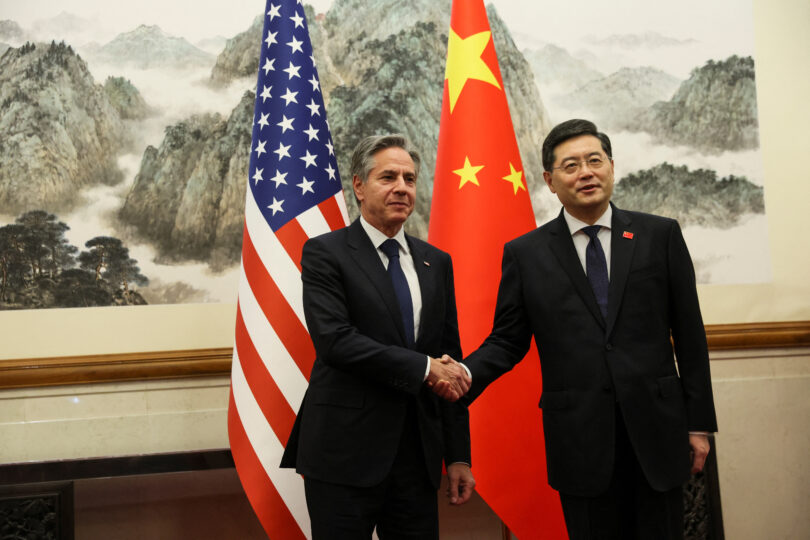Recently, the US Secretary of State, Antony Blinken, and Chinese Foreign Minister Qin Gang met in Beijing and held candid and constructive talks on their differences from Taiwan to trade but seemed to agree on little beyond keeping the conversation going with an eventual meeting in Washington in the coming months. After hours-long delegation-level talks in the famous Diaoyutai State Guest House in Beijing, Antony Blinken stressed the need to reduce the risk of misperception and miscalculation between the two major superpowers of the world, while the Chinese Foreign Minister termed the Taiwan issue as the core of China’s core interests, the most important issue in Sino-US relations, and the most prominent risk. During the joint press stakeout, both leaders emphasized their desire for stable and predictable relations and Foreign Minister Qin expressed readiness to visit Washington in the coming days to carry forward this conversation and make the US-China talks fruitful. During the visit, both sides desire to stabilize their bilateral relations and agreed to facilitate students and common citizens to visit each other country by increasing the number of flights operating between the two nations.
US-China bilateral ties had declined across the board in the past years in various issues ranging from self-governed Taiwan, trade disputes, human rights, and Democracy issues, sanctioning of Chinese tech giants, the war in Ukraine, and others. There had been serious concerns regarding a potential military clash between the two superpowers over the Taiwan dispute that Beijing perceives as its integral part that will finally join mainland China one day. Meanwhile, both superpowers had been at loggerheads at multiple avenues around the globe from South Asia to the Middle East and Africa, and from East Asia to the Solomon Islands in Oceania. Similarly, the trade war brought about by former US President Donald Trump has seriously undermined the economic and trade interest of both nations, fractured the trust of business communities, and deepened the gap between Beijing and Washington over the past years.
Historically, the bilateral relations between Beijing and Washington deteriorated after US House Speaker Nancy Pelosi visit Taiwan in August 2021, followed by a distasteful meeting between Chinese Strongman Xi Jinping and President Joe Biden on the sidelines of a G-20 meeting at Bali in November last year. Meanwhile, multiple cruises of US Naval warships and reconnaissance flights of US aircraft over or near the Chinese territorial waters in the South China Sea had received prompt responses from the PLA and were seriously viewed by Beijing. China termed US military missions in the South China Sea provocative and dangerous and warned of serious repercussions in case of any misadventure by Washington. At the same time, the discovery and shooting down of an alleged Chinese spy balloon over mainland America by the US military was another blow to US-China ties that delayed Blinken’s trip to Beijing for months.
Historically, the recurrent incidents of military standoffs in the South China Sea, and the frequent exchange of furious statements between top executives had caused genuine concerns in the global community and American leaders that a military clash can potentially break out between two superpowers due to misjudgment and communication gap that persists between the two capitals. Previously, the CIA Chief visited Beijing in May to meet his counterpart, restore communication, clear doubts, and build confidence between the premier Intelligence Services of the two competitors. Blinken’s tour has lit up a ray of hope amid deep distrust and apprehensions regarding each other nation. Both sides held comprehensive talks on a wide range of issues covering the most sensitive Taiwan dispute, Xinjiang, Tibet, Hongkong, Human rights and democracy, trade and tariff disputes, military interventions near each other territories, and war in Ukraine, etc. However, no breakthrough was expected at the initial stage and both sides agreed to carry forward this momentum to make their engagement result oriented and fruitful.
No doubt today’s world is a multi-Polar planet and numerous man-made and natural factors are reshaping this globe. COVID-19 dust has not settled down yet, and climate-induced hurricanes, heatwaves, and earthquakes are putting long-lasting effects on victim states, the global economy as well as billions of people living across the globe. Although American strategists perceived the risk of skyrocketing Chinese growth and its ever-increasing stakes in the US economy, however, President Trump initiated a trade war with Beijing during his stay at the White House. Currently, both superpowers are pursuing their manifestos and confronting each other at multiple avenues around the globe. Realistically, both superpowers must respect each other genuine economic, trade, and secuirty interests, keep their wings off territories that are of concern for their contender, and adjust to new realities of the universe. Democracy, religious and media freedoms are the needs of every citizen and no state can ban those civil liberties for a long period of time. Chinese Communist Party must respect and embrace those civil liberties in the greater interest of its nation, which will not only pave the way for a complete assimilation of Hongkong, and Taiwan but also promote pluralism and unity in its society. Today’s world demands political wisdom, resilience, and patience from both contesting superpowers. Although there is no limit to hegemonism, however, wisdom must prevail against ambitions, resilience must defeat jingoism, and co-existence should be preferred over championing. So, this world becomes a peaceful and livable place that offers safety, respect, and equal economic opportunities to all nations in the universe.







